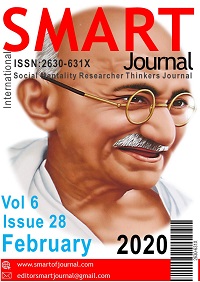Author :
Abstract
21. yüzyılın yeni on yılındayız, uluslararası dünya politikalarımız arasından gözlemlediğimiz barış için yeni tehditler ve fırsatlar yükseliyor. Ancak, sürekli yeni tehlikeler, fırsatlar ve kaos akışının neden etrafta dolaştığını ve insanlığın neden politika etrafında evrildiğini asla unutmamalıyız. Güç bu neden sorusunun cevabıdır ve güç herkes için insan doğasının özü olmaktadır. Ama aynı zamanda insan doğası için başka büyük bir öz olan, ahlakı da hatırlamamız gerekir. Güç ve ahlak aynı resme girdiğinde, bu iki büyük yapı çekirdeğine kadar sarsılmaya başlar. Bunlardan birini kaybetmek diğerinin sonsuza dek baskın olmasına neden olur, ancak onları dengede tutmak ise yolsuzlukla mücadeledir. Ahlak güce olan açlığın altında hayatta kalabilir mi, ya da güç her zaman bir dönüm noktası olmadan ahlakı mı bozar? Yüzyıllardır sabit olan bu asıl sorulara Machiavelli'nin siyaset gerçekçiliğine yaklaşımı daha da fazlasını katmıştır. Bu makale güce ve onun hayatımıza ve bir anlamda siyaset üzerindeki etkilerine olan güç ahlakına odaklanacaktır.
Keywords
Abstract
We are in a new decade of the 21st century, new threats and opportunities are arising for the peace which we observe among our sandbox of international world politics. However, we should never forget why the constant flow of new dangers, opportunities and chaos keeps circling around and why humanity is evolving around the politics. Power is the answer for why and power is the essence of human nature for all. But we also should remember another great essence for human nature is, morality. When power and morality come into the same picture, that’s when the core of both these immense structures starts to be shaken. Losing one of them causes another to be dominant forever, but to keep them in balance is the struggle against corruption. Can morality survive under the hunger for power or power always corrupts the morality without a turning point? Those are the real questions which are constant for centuries some might say since the Machiavelli’s approach to realism of politics brought even more to these questions. This article will focus over the power, and its morality to our lives and to the effects over politics in some sense.
Keywords
- Lammers, J., & Stapel, D. A. (2009). How Power Influences Moral Thinking. Journal of
- Lammers, J., & Stapel, D. A. (2009). How Power Influences Moral Thinking. Journal of Personality and Social Psychology, 97(2), 279–289. https://doi.org/10.1037/a0015437
- Lammers, J., Galinsky, A. D., Dubois, D., & Rucker, D. D. (2015, December 1). Power andmorality. Current Opinion in Psychology, Vol. 6, pp. 15–19. https://doi.org/10.1016/j.copsyc.2015.03.018
- Machiavelli, N. (2008). The prince. Hackett Publishing, pp 66.
- Kortunov, A. V, & Pascal, B. (1988). Realism and Morality in Politics. 1–15.
- Weber, T. (1964). Morality and National Power in International Politics. The Review of Politics, 26(1), 20-44. Retrieved January 27, 2019, from www.jstor.org/stable/1405865
- Gandhi, J., & Przeworski, A. (2009). Holding onto power by any means? The origins of competitive elections. Ms. Emory University.
- Cislak, A., Cichocka, A., Wojcik, A. D., & Frankowska, N. (2018). Power Corrupts, but ControlDoes Not: What Stands Behind the Effects of Holding High Positions. Personality and Social Psychology Bulletin, 44(6), 944–957. https://doi.org/10.1177/0146167218757456
- Sassenberg, K., Ellemers, N., Scheepers, D., & Scholl, A. (2014). Power corrupts” revisited: Therole of construal of power as opportunity or responsibility. J.-W. van Prooijen & PAM van Lange (Eds.), Power, politics, and paranoia: Why people are suspicious of their leaders, 73-87.
- Forst, R. (2005). Justice, Morality and Power in the Global Context. In Real World Justice (pp. 27– 36). https://doi.org/10.1007/1-4020-3142-4_3
- Journal of Politics, Culture, and Society, 3(1), 51-69. Retrieved January 27, 2020, from www.jstor.org/stable/20006937
- Tsahuridu, E. E. (2007). Knowledge is power/power corrupts: should we empower people at work?. In World Ethics Forum (WEF) Conference Proceedings (pp. 379-385).
- Zalta, E. N. (2015). Nietzsche’s Moral and Political Philosophy. In Stanford Encyclopedia of Philosophy. Retrieved from https://plato.stanford.edu/entries/nietzsche-moral-political/





